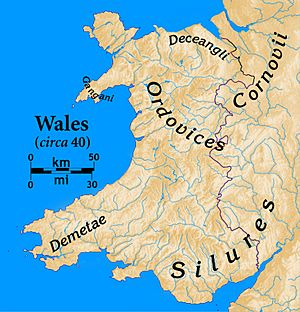Demetae facts for kids
The Demetae were an ancient Celtic group of people. They lived in what is now south-west Wales during the Iron Age and Roman times. Their home was mainly in the areas we now call Pembrokeshire and Carmarthenshire. The name of this tribe also gave us the name for the medieval Kingdom of Dyfed. It also inspired the modern area of Dyfed and a special way of speaking Welsh called Dyfedeg.
Contents
Who Were the Demetae?
The Demetae were one of the many tribes living in Britain before the Romans arrived. They were part of the larger Celtic family of peoples. These groups lived across Europe, known for their unique languages and cultures.
Where Did the Demetae Live?
The Demetae lived in the south-western part of Wales. This area is known today as Pembrokeshire and Carmarthenshire. It's a beautiful region with coastlines and green hills. The tribe's land was important for farming and trade.
What Does the Name "Demetae" Mean?
The name "Demetae" likely comes from an old Celtic word. This word is related to the modern Welsh word defaid, which means "sheep." It also connects to an older word meaning "wealth" or "property."
Why Sheep Were Important
This meaning makes a lot of sense because the Demetae's land was perfect for raising sheep. Sheep would have been a major source of wealth for them. They provided food, wool for clothing, and goods to trade. Even today, this part of Wales is known for its sheep farming.
The Demetae's Lasting Legacy: Dyfed
The name of the Demetae tribe lived on long after the Roman period. The area they lived in became known as Dyfed.
From Tribe to Kingdom
After the Romans left Britain, a new kingdom formed in this region. It was called the Kingdom of Dyfed. This shows how important the Demetae tribe was. Their name continued to identify the land for many centuries.
Dyfed Today
Even now, the name Dyfed is used. It refers to a modern area and county in Wales. There's also a special dialect of Welsh spoken there called Dyfedeg. This means that the ancient Demetae tribe still influences the language and geography of Wales today.
 | Emma Amos |
 | Edward Mitchell Bannister |
 | Larry D. Alexander |
 | Ernie Barnes |


